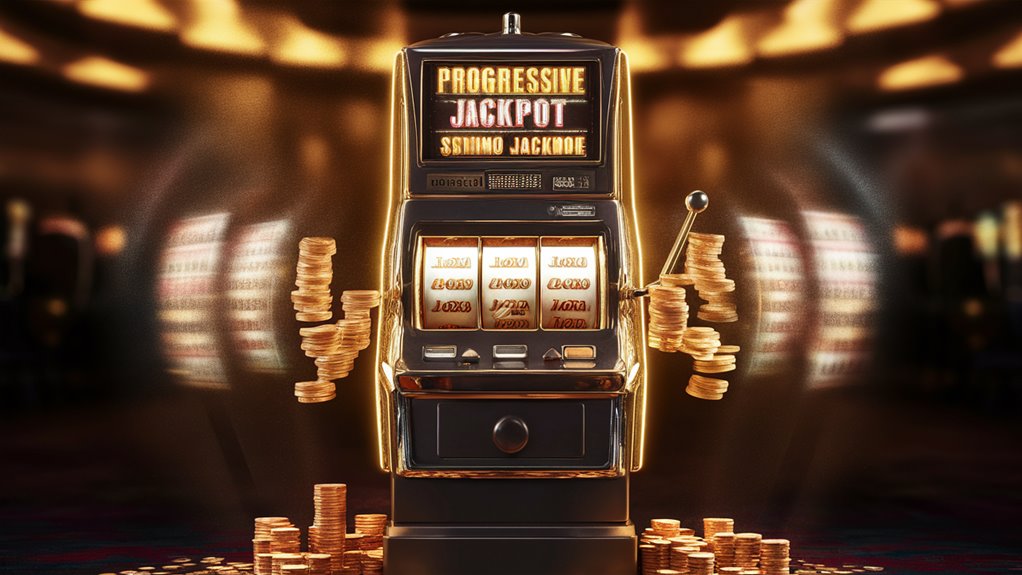Due to your current location, services are not available
Please check local laws and regulations before gambling online
If you would like to place bets on fruit machines, you will have to move to the seaside with them or the local bookmakers. Temporary operation of the floating casino How to Win More on Progressive Jackpot Slots ships in Puerto Rico was “legal” on 2nd July 1997 as a result of a 30-day reprieve granted by the U.S. District Court for the Judicial District of Puerto Rico, San Juan Division.
During 1984 and 1985, the Indianapolis metropolitan area—which included West Lafayette, home of Purdue University, which contributed millions annually to local charities (more than one-third of its population lived below the poverty line)—was the center of what became known nationwide as the “finite tournament.”
The Ultimate Guide to Responsible Gambling
Understanding Your Gambling Behaviors
Responsible gambling starts with self-awareness. Identify your personal gambling triggers – emotional states, situations, or behaviors that lead to betting urges. Keep an accurate gambling diary, recording patterns, money spent, and what your mood was before and after betting activities. Develop a responsible betting budget which is independent of other personal expenses. It accounts for only the money on your person above basic needs, ensuring that essential expenses remain unaffected. Seek help. Building self-exclusion programs provide crucial safeguards against gambling compulsions. Don’t block out software and account restrictions offered by betting platforms. Join gambling prevention services for top interlockers so as to remove the temptation from yourself.
Setting Financial Boundaries
Set strict monetary limits by establishing dedicated gambling accounts exclusive from personal financial resources. Lay out limits for losses and never go over them. Create a responsible betting budget that consists of only disposable income, ensuring that essential expenses remain unaffected. Building a strong support system via professional gaming counseling and associations like Gamblers Anonymous. Share with supportive family members your commitment to responsible betting so they might urge you on more.
Your Trigger Points
Gambling Guide: Understanding and Managing Trigger Points
Setting Financial Limits
Responsible gambling begins with firm financial boundaries. Set a strict monthly gambling budget of only disposable income that won’t impact essential living costs. Your gambling should at no time interfere with crucial payments like housing, utilities, and daily necessities!
Account Separation and Loss Limits
Make separate gambling accounts which are completely divorced from your personal bank accounts in order to ensure financial lines are very clearly marked out beforehand. Implement a strict session loss limit (e.g., a predetermined amount acceptable to lose in one sitting of gambling). When you have exceeded this limit, gambling must cease immediately and without exception.
Transaction Monitoring and Control Measures
All gambling activity should be tracked using detailed record-keeping metrics. The regular documentation of each win and loss in regards to the length of gambling sessions contributes to more accurate accounting. One should entirely steer clear of credit-based modeling, as well as have automatic transfer limits built into both your bank account and gambling portal in order to enforce spending boundaries.
Money Management Tools to Help Mental Accounting and Break Boundaries of Thought
Essential Control Measures
Fix a limit to expenditure on gambling each month. Keep two separate gambling accounts, one for deposits and the other for wins. Set strict limits on the size of loss that can be tolerated. Record all transactions. Put in place automatic limits to control losses. Never bet on credit.
Time and Money Relationship in Gambling
Responsible Gambling: Effective Money Management Tactics
Essential Principles of Proper Time Management
Proper control of time is the foundation of responsible gambling behavior, involving three principles: session limits, break strategy, and emotional state observation.
Implemented Time Limits
A rigid timetable is imposed on gambling activities, which ensures a clear division between where sessions are cut off and judged to have ended. A session should not last longer than 1-2 hours at the most. It’s better if they are kept short and in accordance with the gambler’s physical condition. When that time comes around, gambling activity has to be stopped immediately.
Break Strategy
Scheduled rest breaks of 10-15 minutes every hour are essential turning points in the course of gambling sessions. They supply necessary occasions to keep one’s calm head and see what one is capable of doing, and by maintaining this orientation, it becomes possible both to organize oneself for what needs focus at present or consider if any action would be better left until later.
Emotional State Control
Emotional control plays an important part in proper gambling conduct by keeping it out of your control. Do not gamble when your emotions are running high, either positively or negatively. Strong emotions influence decision-making abilities and can lead to long periods of extended gambling.

Timekeeping and Analysis
A comprehensive breakdown of your yearly gambling hours from year to year can be had by using systems (or programs) designed specifically for such purposes. Frequently measuring the amount of time you spend gambling and how often helps guarantee that you will manage a healthy mix between gambling activities and other vital life commitments.
Key Components of Time Management
The duration of each counseling session should be controlled within one to two hours. It may be necessary to stop for a break every 10 to 15 minutes following an hour-long session. First, let’s make it a habit to keep records. Your daily and weekly loggings will help keep you on track with this plan. Before a session begins, measure your current mental state to give you an idea of what changes have occurred since last time.
Signs of a Gambling Problem
Key Habitual Clues
Responsible gambling hinges on early recognition of danger signs. Recreational gambling becoming a serious issue can be indicated by several crucial signs.
Financial signs of trouble are:
- Going over what you can afford
- Taking personal or group loans out to finance gambling habits
- Using money that should go on necessities for betting
- Placing steeper and steeper bets just to receive thrills
Psychological and Emotional Alarm Signs
Indications to look out for are:
- Restless when unwanted to gamble
- Playing to run away from emotional problems
- Getting strong desires to bet
- Unwelcome thoughts of gambling activities
Effects on the Person’s Career as well as Their Social Relationships
Typical signs of problematic gambling behavior include:
- Hiding from the family that you’ve been The Psychology of Risk-Taking in Gambling gambling
- Falling behind in your work
- Ruining family relationships
- Lying about how often and for how much money you’ve bet
Highly Dangerous Actions
There are dangerous signs or potential disasters that are required to be acted on immediately:
- Trying to recoup losses by continuing to bet
- Failing to control gambling habits
- Jabs at your career
- Despite negative feedback, continues gambling
When a combination of these warning signs is evident, it is time to seek the help of a professional. Proper intervention can avoid the development of serious gambling problems and safeguard financial and emotional well-being.
Self-Exclusion and Help Services
Self-Exclusion vs. Gambling Help Advisors
Understanding Online Opt-out Packages
Programs allowing for self-exclusion provide an indispensable resource for those who wish to free themselves from the bondage of problem gambling. With these, it is possible to exclude yourself from both traditional betting shops and gambling websites.
Professional Support Services
The National Problem Gambling Helpline (1-800-522-4700) offers this vital service. It provides complete privacy and is available at all times of day or night, allowing anyone to be put in touch with a nearby certified gambling counselor.
Many states offer specialized treatment programs at no cost or low cost to help those struggling with alcohol abuse. Among the important components of a drug rehabilitation program, this one stands out. Gamblers Anonymous meetings offer peer support through its well-established 12-step recovery program.
Comprehensive Treatment Options
Family support and therapy have a vital place in recovery. It is only through the combined help of patient and counselor that we can attempt to throw off the heavy burden on families wrought by gambling problems themselves. Qualified counselors can help to rebuild trust between family members, develop healthy patterns of communication, formulate a plan for financial recovery, and set up boundaries and lines of support.
Medical Support
Healthcare providers can assess and treat co-occurring conditions such as depression and/or anxiety, and regularly monitor progress in your recovery program.
Building Healthy Substitute Activities for Recovery
It is essential to establish meaningful activities outside of gambling, so that recovery is sustainable and there can be growth in your personal life. With such a purposeful, rich life, you can fill the void and direct your energies toward positive activities that lead ultimately to healing.
Core Substitute Activities for Recovery
Physical wellness activities can substitute powerfully for gambling:
- Regular exercise and participating in sports
- Outdoor activities like hiking and gardening
- Yoga and meditation, being mindful through physical activity
- Fitness classes, company as well as physical welfare
Creative pursuits of both an intellectual nature and those not so orthodox are engaging the mind constructively:
- Learning new crafts or hobbies
- Reading and writing, bringing forth from within oneself one’s own poetry
- Art and music: passages, tangents that allow How to Choose the Right Casino Loyalty Program us sometimes to grasp things in more than one way
Building Sustainable Routines
Establish a continuing pattern of days that will include:
- Regular hours for sleeping
- Time of Day where people eat and what they eat in those periods
- Scheduled times devoted to exercise
- Social events and associations with others
Social Connection and Support
Establish regular habits that help maintain good relations among:
- Family activities and spending time
- Support group and Alcoholics Anonymous participation
- Maternity group
- Community service projects
- Sports clubs or hobby groups
Professional Development
Focus on opportunities for career growth, whether in-house or out:
- Skill-training programs
- Certificates
- A series of NETWORK meetings
Mindful Living Practices
The key is to learn how to live and https://livin3.com take care of yourself:
- Deep breathing exercises
- Progressive muscle relaxation
- Mindfulness meditation
- Journaling and reflecting
This alternative approach sets the stage for recovery while encouraging personal growth and spiritual well-being.


